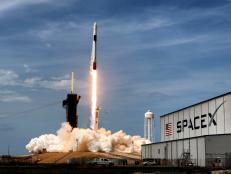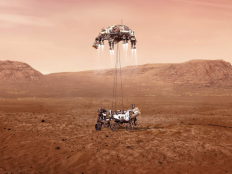All Space Articles
Showing 421 - 435 of 491 results
Curiosity Daily Podcast: What Neanderthal Genes Are Doing in Your DNA, The Time Photosynthesis Killed Nearly All Life on Earth, and the Inventor of “Do, Re, Mi” Notation
Learn about what Neanderthal genes might be doing in your DNA; Guido d’Arezzo, the 11th-century Benedictine monk who invented “Do, Re, Mi” notation, or solfège; and how photosynthesis killed off 99 percent of life on Earth during the the Great Oxygenation Event.
Curiosity Daily Podcast: How Loud Is the Sun?
Learn about a simple way to reduce your internet carbon footprint; how brain images can make you more likely to believe fake science; and how loud the sun is.
Launch of SpaceX’s Starlink: A “Mega-Constellation” of Internet Satellites
Starlink is a growing network of satellites capable of providing high-speed internet access across the globe. On August 7 at 1:12 AM EDT, a new batch of satellites will launch from Cape Canaveral, Florida.
Curiosity Daily Podcast: Why Asthma Gets Worse at Night, Earth’s Largest Living Thing
Learn about a heroic experiment that helps explain asthma getting worse at night; and the largest living thing on earth.
NASA's Biggest 2021 Milestones
From making history on Mars to supersonic aircraft, NASA continues to astound us with science from this past year.
Curiosity Daily Podcast: Prince Rupert’s Drop, Why Earth’s Core Is Younger Than Its Surface, and Newborn Babies May Be Super Smart
Learn why a Prince Rupert’s drop is both super-fragile and virtually unbreakable; why researchers think newborn babies are a lot smarter than they look; and why Earth’s core is younger than its surface.
Curiosity Daily Podcast: NASA's InSight Lander Mars Mission, the Chicken or the Egg, and Common Synesthesia
Cody Gough and Ashley Hamer discuss the following stories from Curiosity.com to help you learn something new in just a few minutes:
Curiosity Daily Podcast: Explorers Club - George Nield
Today, we’re talking to Explorers Club member, Dr. George C. Nield. Dr. George C. Nield is currently the Associate Administrator for Commercial Space Transportation at the Federal Aviation Administration (or FAA).
Curiosity Daily Podcast: Apes Say Hello, Life on Snowball Earth, Learn Twice as Fast
Learn about non-human animals that say hello and goodbye; life on Snowball Earth; and how to learn skills twice as fast.
Curiosity Daily Podcast: Exercising for Different Body Types, New England Vampire Panic, Non-Vertical List Benefits, and Constellations on Mars
Learn about how your body type affects the way you should exercise; the New England Vampire Panic; what our constellations would look like if we saw them from Mars; and the benefits of writing a better, non-vertical list to organize your thoughts.
Curiosity Daily Podcast: Why You’d Choose Your Biases Over Money, Coldest Inhabited Place on Earth, and Dark Fluid
Learn about why your biases are so strong, you’d choose them over making money; a new theory that “dark fluid” might mean that dark matter and dark energy are the same weird substance; and Oymyakon, one of the coldest places on Earth where people continuously live.
Curiosity Daily Podcast: Passion for Your Job Can Backfire, Ancient Greeks Knew Earth Was Round, and Hair in Food
Learn about how the ancient Greeks knew the Earth was round; why being passionate about your job can backfire; and why you shouldn’t worry if you find a hair in your food.
Curiosity Daily Podcast: Multitasking Is Impossible, How A Flat Earth Would Even Work, and Nearly Every Country’s Name Origin
Learn how a flat Earth would even work; why multitasking is impossible, and what you should do instead; and the four things that nearly every country on Earth is named after.
Will Sending Aliens Nudes Lure Them to Us? NASA Thinks so.
NASA scientists want to send naked pictures of humans to space in hopes of potentially making contact with aliens.
Curiosity Daily Podcast: Pretzel History, How Earth Got Its Water, Runner’s High Origins, and Words Named After People
Learn about where the water on Earth might have come from; the surprising history of the pretzel, including the monk who invented it; words you probably didn’t know are named after people; and where “runner’s high” comes from, and whether it’s genetic.













